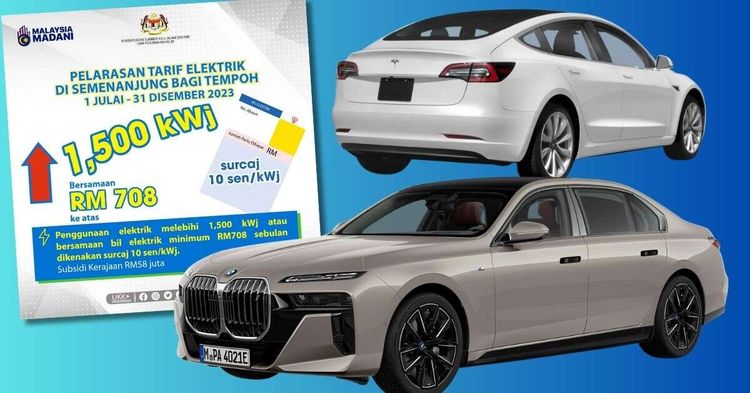10 sen surcharge - EV owners may have to pay more to charge their cars under new 2H 2023 ICPT scheme - paultan.org

Local updates / By Paul Tan / June 24th, 2023 7:45 in the morning / 30 remarks
Electric car owners might have to shell out more money for charging their vehicles at their homes due to the latest ICPT plan that has been launched for the latter half of 2023. Customers using over 1,500 kWh of electricity per month will have to pay an additional RM0.10 for every kWh used, resulting in an overall increase of RM0.12 compared to the RM0.02 discount granted earlier.

The topmost rate for residential electricity, which is RM0.571 per kWh and is usually utilized to compute residential charging expenses for electronic vehicles, now stands at an effective rate of RM0.671 per kWh.
Usually, we make use of the RM0.571 rate due to the high cost of EVs and their usage at homes with a monthly electricity consumption of over 901 kWh. This level of consumption attracts the highest tariff specifically for residential use.

Keep in mind that the additional charge of RM0.10 per kWh is not limited to electricity consumption exceeding 1,500 kWh. As soon as your electricity usage goes beyond 1,500 kWh, the supplementary fee will be added to your entire TNB invoice.
If you are using little electricity and you add an electric vehicle to your household, your electricity bill might go up a lot, even more than just what the EV uses. This is because the cost of electricity for all other things will also increase.

Around 83,000 users will be impacted by the additional fee. However, for those who consume less than 1,500 kWh per month, they can still take advantage of the RM0.02 ICPT discount that was available before.
The government revealed that the typical price for fuel during the first half of 2023 was USD173.50 for each metric tonne. This is lower compared to the previous rate of USD224 per metric tonne, which was utilized in calculating the ICPT rate before.

Furthermore, the administration revealed its plans to modify the residential solar photovoltaic (PV) Net Energy Metering (NEM) program. The new scheme will be less limiting than the present rules, which permit a maximum of 10 kW for 3-phase supply and 4 kW for single phase supply. However, there is no additional information regarding this matter at this time.

The ICPT is a process that regularly assesses the cost of electricity every six months, including changes in fuel pricing, which makes up 65% of the total cost of electricity. It gets updated every six months, taking into account the previous six months, which means that the new ICPT fee for the second half of 2023 was determined by the fuel prices from the first half of 2023.

Paul Tan started this website as a personal blog that covered different topics of his interest. He had been involved in the IT industry for many years. However, as more and more people showed interest in his motoring stories, he decided to focus on this topic. And now, the website has become a huge success.




































